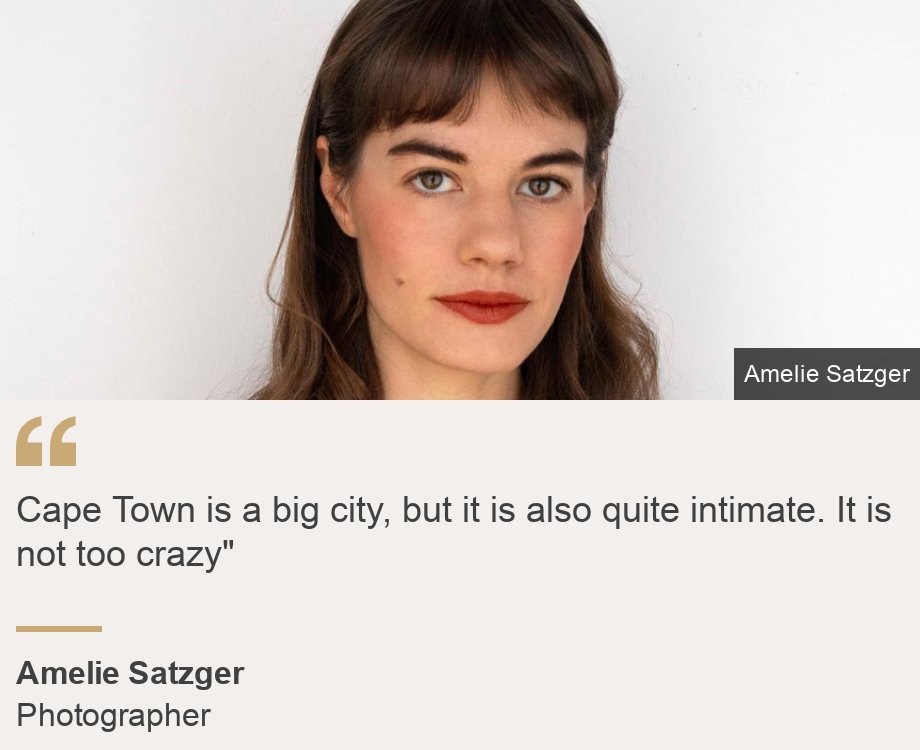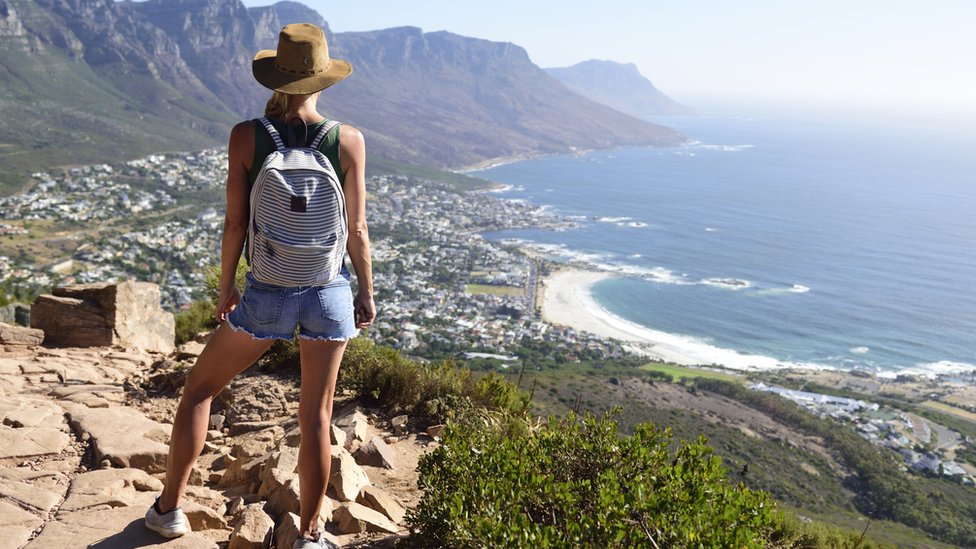Supporters see the international influx as a financial boon and something to be encouraged, but their detractors are not so kind.
For 25-year-old South African social media content creator, Az’emahle Dyubeni, the city is facing a “digital nomad epidemic” that is pushing up housing and other costs.
Ms Dyubeni has lived in the beautiful coastal city all her life and says since Covid-19 the number of remote workers, mostly from the West, has increased substantially. Though no official figures exist, she is not alone in noticing a change.
“When I walk into a cafe I hear German, French, Dutch and American accents,” she tells the BBC, painting a vivid picture of the international flavour of Cape Town’s new workforce.
If all that is needed is a decent internet connection then why not set up in one of the world’s most picturesque cities?
With Table Mountain in the background, ocean vistas and a perfect summer climate, the attraction is obvious compared to a mundane, grey office cubicle.
On a TikTok video, Marley Rose Harris, who describes herself as a digital entrepreneur, calls the city the “most magical place in the world”.
Currently many of these visitors, who do things like copywriting or digital content creation, are allowed to live in the country and work for a foreign company for up to 90 days, though the time varies depending on their nationality.
“Cape Town is an ideal destination for digital nomads who are looking to blend aspects of tourism and work into their day-to-day activities,” says Alderman James Vos, who is on the city’s committee for economic growth.
He adds that research shows that these working visitors bring in a lot of much-needed money during their stay – around $2,700 (£2,139) each.
The national government has also taken notice.
In February, President Cyril Ramaphosa announced a proposal for a remote-working visa that would be available to “so-called digital nomads, who are able to work virtually from any location in the world” and are employed by foreign organisations.
The details though have not been fleshed out.

Amelie Satzger, a 29-year-old photographer from Germany, has had two stints as a digital nomad in Cape Town over the past two years and welcomes the idea of a special visa.
Her German passport allows her to stay and work in South Africa for up to three months, but her Polish boyfriend’s passport only lets him be in the country and work for 30 days.
She hopes the proposed visa will help more people who want to work in Cape Town for longer stints.
Ms Satzger says the warm weather, community and the low cost of living, compared to Germany, are the reasons she wanted to return. She says earning euros makes it easier to get by in the city.
Despite rising prices in South Africa, getting paid in a foreign currency can often mean the money will go further.
“Cape Town is a big city, but it is also quite intimate. It is not too crazy,” she says.


Ms Satzger is part of various WhatsApp groups with other digital nomads who go free diving, hiking and surfing together in their spare time.
She has also made many South African friends she met through her meditation group.
“[When] I come back, you have people who are excited to see you,” she says.
But many Capetonians do not feel this way, going by the volume of complaints on social media, including videos on TikTok and comments on X.
Ms Dyubeni says she is being priced out of the city where she has spent her entire life. She fears that she will never be able to afford to move out of her parents’ and live on her own like she had always hoped.


There are a lot of people chasing too few properties in Cape Town and the rental costs are the highest in the country. The average rent is around $540 a month and prices rose by just under 4% between 2022 and 2023, according to South African property site PayProp.
“These digital nomads are making Cape Town unliveable,” she sighs.
Grant Smee, a rental agent based in Cape Town, tells the BBC there has been a “significant spike in foreigners seeking three-to-six-month rentals”, indicating a rise of remote workers.
This is a growing concern for locals as they are being priced out of the housing market, he says.
Mr Smee says foreigners have more power than locals because they can offer landlords a higher rent than the asking price, or they pay for a few months upfront – which many South Africans cannot afford to do.
Ms Satzger says she understands the frustration many local people feel, as she has noticed housing in the city has become increasingly scarce.
Rental expert Mr Smee says that if the proposed digital nomad visa is introduced this could worsen the housing situation.
The city government has pledged to protect local communities.
“This means cultivating a destination that not only captivates visitors but also enriches the lives of those who live and work here.
“Part of this is ensuring a destination that is accessible, affordable and that retains, celebrates, and empowers the communities and cultures that make it unique,” says local politician Mr Vos.
But Mr Smee believes the city authority needs to take a step further and implement rent control, though he can see that most landlords would be against this.
He acknowledges that capping rents “is an extreme solution [but] it is becoming increasingly clear that further regulation is needed to protect the interests of locals”.
Ms Dyubeni also points out what she sees as a double standard in the idea of creating a special digital nomad visa for visitors who mostly come from Europe and North America.
Migrants from the rest of the African continent are sometimes viewed with suspicion and immigration levels have become a major issue ahead of next month’s general election.
“It begs the question, who is more important – Africans or Europeans?” Ms Dyubeni asks.
But while the grumbling from many locals continues, there is little sign that local rules will change, and the beauty of the place that is also known as the Mother City will continue to draw digital nomads to its shore.
